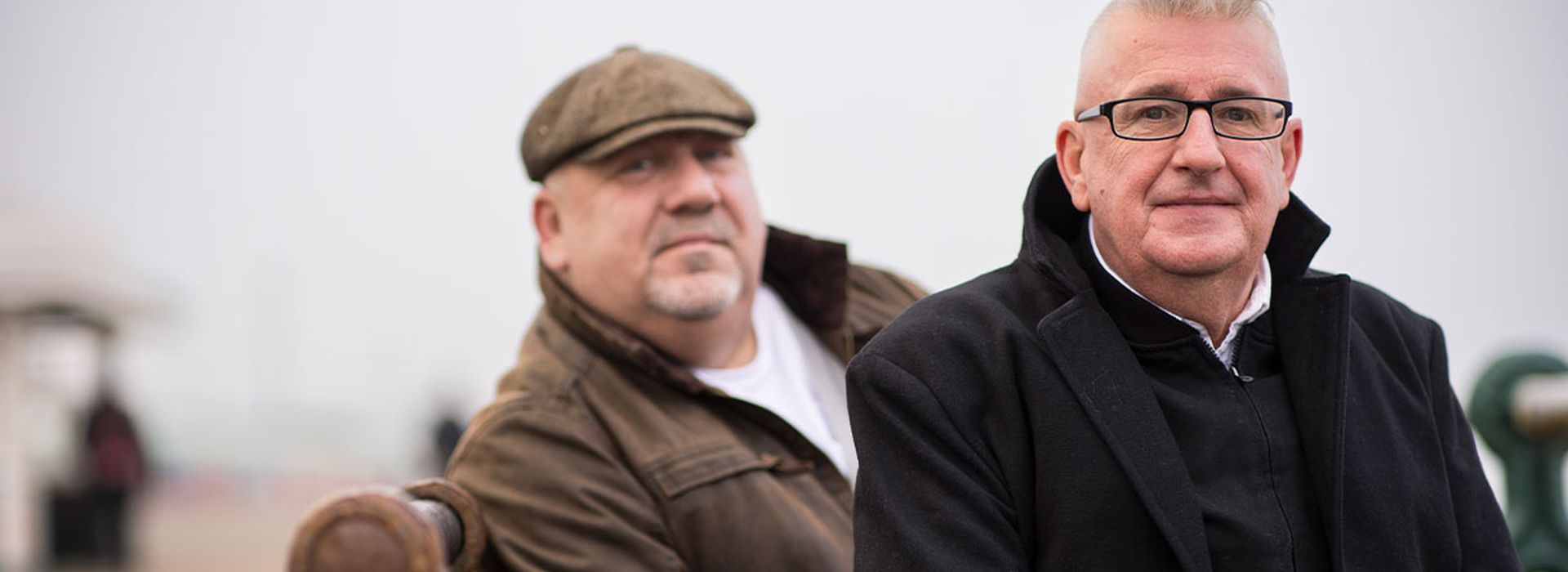Charles' story – the privilege and burden of caring
Tuesday 31 January 2023
Maggie's, Royal Marsden

Supporting someone through treatment takes its toll, especially over a number of years. But what do you do if they decide they want to come off treatment entirely?
I’ll never forget walking into Maggie’s for the first time. I’d spent years waiting, hours, months, weeks of our lives in waiting rooms and hospitals.
To walk through Maggie’s door, even now, is a very powerful memory for me.
Martin always says it’s like stepping out of the gloomy world of Kansas, into the beautiful world of Oz, from gloomy black and white into technicolour.
Martin
My husband Martin and I have been together for 15 years.
Before his diagnosis, we had a lovely pattern, pottering about, just doing what we loved, not getting up to much.
Martin’s cancer came five years into our relationship.
It’s odd because you do forget those first five years a bit. Or at least, you don’t forget them, but everything becomes coloured.
The reference point tends to become not when did we meet, but when did he get cancer.
That’s what cancer does, it just invades everything. It changes all your plans, and how you live, and how your relationship is.
Before cancer, we had five years of enjoying the normal things in life. I had an idea of what my life was, and it just disappeared.
Coming off treatment
After almost a decade of living with cancer together, Martin made the decision to come off treatment.
It had been gruelling, challenging, impossible for too long. It’s very hard to express the effect of what we’ve been through, how complicated it became, and how it impacted on every single part of your life.
He was hospitalised for weeks with covid, came off oxygen and told me his decision.
He said that he had realised that he couldn’t do it any more, that he had been continuing his life for others, and not for himself.
He wanted to have a decent quality of life, over quantity, and that meant stopping treatment. We spoke, I listened, and I told him I would support him.
The enormity of the decision was huge. There was so much for me to make sense of, and days when all I’ve been able to do has been to cry.
Supporting Martin
Coming to Maggie’s after that point was crucial for me.
At Maggie’s, I was suddenly being asked how I was doing, after years of just focusing on Martin.
The psychological support I received from Maggie’s helped me through really difficult decisions, in a difficult subject, in a kind and considered way.
Part of what can be so difficult when you’re caring for someone is that nobody seems to be appreciating the pressure that you can be under yourself.
The decision made me realise how much I’ve sacrificed as well. In the last two or three years, I’ve gone from a career and a profession, to having none of that any more.
It’s not without sacrifice and hardship. But when your feelings are absolutely and unreservedly acknowledged, understood with an intelligence and a power – as mine have been at Maggie’s - then you can see them for what they are, just feelings.
What we’re doing isn’t easy, and we’ve shed buckets of tears over it.
But neither is having treatment on treatment, waiting and being disappointed.
It’s an awful choice, for Martin and for others. But we’re preparing for it in a lovely way, quietly with the people who love him, and it’ll be ok.
Life is lovely without traipsing up to endless hospital appointments.
End of life
We’ve done an awful lot of work around Martin’s end-of-life.
Advanced statements, advanced directives, planning the funeral, telling our families, and trying to tell them why we made the decision and what the benefits are.
From making the decision to come off treatment, it’s actually been very busy.
We have the luxury of planning for a good death, and getting everything in place. We can share the process together.
My parents are buried in a beautiful church called Okewood Church. You can hear the birds call, and see nature close-by.
Martin is so proud at the thought that he will rest at my family plot, because he knows he’ll be safe there.
It’s a wonderful opportunity: you plan and prepare for a birth, you put so much into that, so it’s really nice to prepare for end-of-life together.
It’s not going to be running around, and sorting out family. It’s going to be a great way to leave the world.
I wish there was more discussion of this more generally, giving people that power, that opportunity to just think about it, to ask the questions you need to, and to be supported to find the right answers for them.
Being at peace
Coming off treatment, Martin just enjoys every day that he wakes up.
Ever since he made that decision, his power, his confidence, his happiness and his well-being returned.
He’s got rid of what caused him trouble and grief and trauma. When he talks now, he says he is at peace with himself, happier, contented.
Now he’s made this decision to prioritise quality of life over quantity, it’s as though every day is sunny.
We're here for you
If you or someone you love has cancer, Maggie's is with you.
Come and see us at your nearest Maggie’s, call us on 0300 123 180 or email us at enquiries@maggies.org
More stories from our centres
Show more storiesGet cancer support near you
To find your nearest Maggie's centre, enter your postcode or town below.
